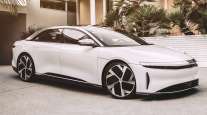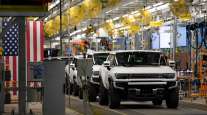French Startup Develops Tech to Convert Diesel Cars to Electric

[Stay on top of transportation news: Get TTNews in your inbox.]
About 5,000 euros ($5,600) are set to buy your 10-year-old combustion clunker an electric makeover — and offer a cut-price way to avoid driving bans across European cities.
French startup Transition-One has developed retrofitting technology that adds an electric engine, batteries and a connected dashboard into older models of Fiat Chrysler Automobiles NV, Volkswagen AG, Renault SA and PSA Group for about 8,500 euros, or 5,000 euros after government subsidies in France.
“I’m selling to people who can’t afford a brand new 20,000-euro electric car,” founder Aymeric Libeau said in an interview aboard his first prototype, a Renault Twingo from 2009 with an electric driving range of 180 kilometer (112 miles). “We’re turning the best-selling models across Europe into electric cars.”
Libeau expects French and European regulator approval by the end of the year and will start pre-orders in September to test demand.
Automakers are rushing to churn out electric cars to comply with stricter regulations on emissions in Europe. While sales are rising, hybrid and battery cars made up less than 3% of total sales last year as vehicle prices remain comparatively high with shorter driving ranges than conventional models.
Even as the tepid uptake is set to reverse in coming years, initiatives such as Transition-One’s show the car industry still is trying to navigate a path toward an electric future, with the risk of outright driving bans giving birth to moonshot ideas.
Several cities already have started to ban older diesel cars, after the 2015 Volkswagen diesel emissions-cheating scandal prompted scrutiny of cars flouting limits. Over the next decade, many more European cities will cut access to fossil-fuel cars altogether.
In the prototype Twingo, three battery packs are fitted in front and two in what used to be the gas tank. The whole pack, bought from a Tesla Inc. parts reseller, weighs 265 pounds. To compare, Renault’s electric Zoe has a 290-kilogram battery (639 pounds) for a driving range of 210 kilometers (131 miles. Prices start at around 23,000 euros excluding battery rental.
The transition takes less than a day, leaving the original stick shift and gear box and installing the plug behind the hatch that drivers usually pop open to refill the tank.
There are doubters on Libeau’s approach and questions over how attractive a shortened driving range will be to motorists. Markus Lienkamp, a professor of automobile technology at the Technical University of Munich, also warns against the risk of errors and the difficulty of obtaining regulatory approvals for the retrofitted cars.
“You could technically turn a handcart into an electric car — the question is, does it make sense and how big is the effort?” Lienkamp said. “My advice would be to drive the combustion car as long as it can take, and just buy a new electric car after, because it makes much more sense financially.”
Libeau, whose previous experiences include co-founding software company Pentalog Group, has worked on retrofitting for two years and tested the method with a French business school. He is looking to raise 6 million euros to build a factory he says would be capable of churning out as many as 4,000 vehicles next year.
Retrofitting services have so far focused on one-offs for classic cars with a number of small companies offering a variety of conversion kits. What’s specific with the French startup is a plan to help create a regulatory framework rather than case-by-case permits to broadly offer the technology.
Carlos Tavares, CEO of PSA, has called the idea of retrofitting “great” while cautioning that large companies needed worldwide regulations on emissions and safety before going down this road. “For that to happen, first thing is: align regulations,” he said on his online show #ACoffeeWithCarlosTavares earlier this month.
Transition-One’s solution is compatible with models including PSA’s Citroen C1 and Peugeot 107, Fiat 500, Toyota Aygo, Twingo II and Volkswagen Polo.
“If the end goal is to cut pollution, all solutions should be on the table,” Libeau said, driving in the dense traffic of central Paris. “New cars aren’t enough.”




